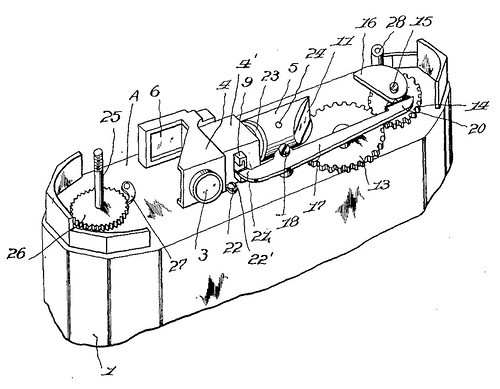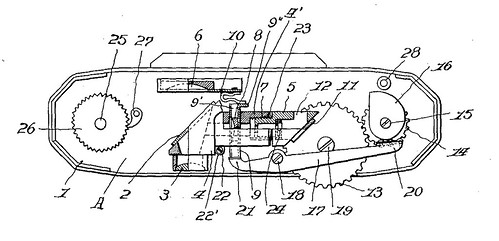Difference between revisions of "Mamiya Six IV"
(→Overview) |
(→Technical details) |
||
| Line 15: | Line 15: | ||
and the USA for $99.95 in 1954<ref>Sales price in the USA in 1954: Mamiya IV with Olympus D Zuiko F.C. f/3.5 (black face) $99.95; Auto-up $18.95; Flash $19.95 (The Complete Photo Equipment Guide. <i>U.S. Camera</i> November 1954, p. 89 [http://static.photo.net/attachments/bboard/00V/00VBu7-198453584.pdf|pdf file]</ref> | and the USA for $99.95 in 1954<ref>Sales price in the USA in 1954: Mamiya IV with Olympus D Zuiko F.C. f/3.5 (black face) $99.95; Auto-up $18.95; Flash $19.95 (The Complete Photo Equipment Guide. <i>U.S. Camera</i> November 1954, p. 89 [http://static.photo.net/attachments/bboard/00V/00VBu7-198453584.pdf|pdf file]</ref> | ||
| − | == Technical details == | + | == Technical details and variants == |
:TEXT TEXT TEXT | :TEXT TEXT TEXT | ||
:The top of the camera housing has retained the same curved shape as that of the [[Mamiya Six III]], but the redesign of the rangefinder saw Mamiya dispensing with the small [[Brillant]]-type waist level viewfinder. as a result, the front housing has only two windows, a square viewfinder window, which is surrounded by a small rectangular plate, and the small round rangefinder control window. | :The top of the camera housing has retained the same curved shape as that of the [[Mamiya Six III]], but the redesign of the rangefinder saw Mamiya dispensing with the small [[Brillant]]-type waist level viewfinder. as a result, the front housing has only two windows, a square viewfinder window, which is surrounded by a small rectangular plate, and the small round rangefinder control window. | ||
Revision as of 00:54, 5 January 2011
| PLEASE DO NOT LINK THIS PAGE UNTIL FINISHED--MY SANDBOX IS OVERFLOWING |
Contents
Overview
The Mamiya Six IV was introduced in the fourth quarter of 1947.[1] The Mamiya Six IV was a major redesign of the Mamiya Six III, dispensing with the small waist-level viewfinder. That space was taken up by a newly designed range-finder mechanism, which had been developed by Mamiya Seiichi in March 1947.[2]
As part of the export drive tightly managed by the U.S. administration,[3].Mamiya cameras were sold overseas in large quantities[4] and less so on the domestic market[5] In September 1948 Mamiya reputedly ranked as top exporter of the Japanese camera industry.[6] One major contract, signed in December 1948, was the manufacture of Mamiya Six IV models for the Indian distributor Patel, who sold these units badged as CAMEX Six.[7]. These orders and the steady growth of the export market saw the monthly production of Mamiya Six IV models rise from 600 units per month in November 1950 to 1,500 units in March 1953.[8]
The camera was sold in Japan for ¥ ¶¶¶.[9] A certain black-market trade (proably by servicemen stationed in Japan) seems to have existed in countries where formal imports did not occur until later.[10] It is listed in Australia for £24 10s in 1952[11] and the USA for $99.95 in 1954[12]
Technical details and variants
- TEXT TEXT TEXT
- The top of the camera housing has retained the same curved shape as that of the Mamiya Six III, but the redesign of the rangefinder saw Mamiya dispensing with the small Brillant-type waist level viewfinder. as a result, the front housing has only two windows, a square viewfinder window, which is surrounded by a small rectangular plate, and the small round rangefinder control window.
- In keeping with the directives of the U.S. administration of Japan, Mamiya cameras produced between 1947 and 1949 were marked " Made in Occupied Japan." The early variants had this statement prominently engraved into bottom of the metal housing or on the film advance knob, but the later production was allowed to use text embossed into the leather covering of the door catch.[13]
Variant A
- The inscription "Made in Occupied Japan" is engraved on the film advance knob.
Variant B
- The inscription "Made in Occupied Japan" is engraved on the bottom plate.
Variant C
- The inscription "Made in Occupied Japan" is embossed into the leatherette of the door closing mechanism.
Variant D
- The inscription "Made in Japan" is embossed into the leatherette of the door closing mechanism
CAMEX Six
- In December 1948 Mamiya signed a major export order with the Indian distributor Patel.[14] A large number of custom-badged Mamiya Six IV were produced,[15] carrying on the top housing the engraving "CAMEX SIX PATEL INDIA LTD" instead of the standard 'MAMIYA-6.' In every other aspect these Indian export models are build-identical with standard Six IV models and retain the Mamiya logo both (engraved) on the top housing and (embossed) on the front door.[16]
Dimensions
- TEXT TEXT TEXT
Lens and shutter combinations
- Novar Anastigmat f/3.5 75mm
- Olympus D Zuiko F.C. f/3.5 75mm
- Olympus Zuiko C f/3.5 75mm
- Olympus Zuiko Coated f/3.5 75mm
- Olympus Zuiko F.C. f/3.5 75mm
- Setagaya Kōki Sekor T f/3.5 75mm (silver face)
- Takatiho Tokio Zuiko f/3.5 75mm
- Tokyo Opt. Co. C. Simlar f/3.5 75mm
Variant A
Variant B
Variant C
Variant D
CAMEX Six
- Minolta Rokkor 75mm f/3.5
- Olympus Zuiko Coated f/3.5 75mm
- Takatiho Tokio Zuiko f/3.5 75mm
- Carl Zeiss Jena f/3.5 75mm
  
|
  
|
| Mamiya Six IV no.35446, Zuiko 7.5cm f/3.5 lens no.38265. Pictures courtesy of Adrian Gotts. (Image rights) |
Advertisements
 Ars Camera May 1948 |
 Asahi Camera (アサヒカメラ) Camera May 1950 |
 Asahi Camera (アサヒカメラ) June 1950 |
 Asahi Camera (アサヒカメラ) Aug 1950 |
 Photo Art (フォトアー) Jan 1951 |
 Asahi Camera (アサヒカメラ) Mar 1951 |
 Asahi Camera (アサヒカメラ) Jul 1951 |
 Asahi Camera (アサヒカメラ) March 1952 |
| http://XXXX.jpg | http://XXXX.jpg | http://XXXX.jpg | |
| Post-War advertisements for the Mamiya Six IV Images by Rebollo_fr. (Image rights) | |||
Patent Application
 
|
http://TEXT.jpg |
| Redesigned rangefinder of the Mamiya Six. US Patent US 2,808,770 (left) and actual example (right) Images by Dirk HR Spennemann (Image rights) | |
Notes
- ↑ Asahi Camera ¶¶¶¶¶ Neco's Mamiya page.—The Mamiya Six IV is not listed in the Price Board Notification nº 554 of 3 September 1947 (Official Gazette-English Edition [Tokyo: Government Printing Bureau] nº 429, 3 September 1946, pp. 2-4).
- ↑ Mamiya. A History of Innovation. Mamiya 50th Anniversary. Produced by the Mamiya-History of Innovation Editorial Committee. Bunkyo-ku, Tokyo: Mamiya Camera Co. Ltd. p. 5.
- ↑ Japanese camera manufacturers were gradually allowed to trade freely with overseas countries. For example, unregulated export to the U.S.A, France, India and Hong Kong commenced in August 1947 (Mamiya. A History of Innovation. Mamiya 50th Anniversary. Produced by the Mamiya-History of Innovation Editorial Committee. Bunkyo-ku, Tokyo: Mamiya Camera Co. Ltd. p. 5).
- ↑ For example, the first order to Hawai'i was shipped in April 1948 and to Canada in November 1949. The European market (Italy, Switzerland) was opened up by April 1950 (Mamiya. A History of Innovation. Mamiya 50th Anniversary. Produced by the Mamiya-History of Innovation Editorial Committee. Bunkyo-ku, Tokyo: Mamiya Camera Co. Ltd. p. 5-6).
- ↑ Unlike with the early Konica I models, we have only very few Mamiya Six copies with an engraved CPO [Central Purchasing Office] mark. Yet, the Mamiya company history notes that by April 1949 business with the PX system was thriving. It is possible that by the then CPO marking had been abandoned. (Mamiya. A History of Innovation. Mamiya 50th Anniversary. Produced by the Mamiya-History of Innovation Editorial Committee. Bunkyo-ku, Tokyo: Mamiya Camera Co. Ltd. p. 5).
- ↑ Mamiya. A History of Innovation. Mamiya 50th Anniversary. Produced by the Mamiya-History of Innovation Editorial Committee. Bunkyo-ku, Tokyo: Mamiya Camera Co. Ltd. p. 5.
- ↑ Mamiya. A History of Innovation. Mamiya 50th Anniversary. Produced by the Mamiya-History of Innovation Editorial Committee. Bunkyo-ku, Tokyo: Mamiya Camera Co. Ltd. p. 5.
- ↑ Mamiya. A History of Innovation. Mamiya 50th Anniversary. Produced by the Mamiya-History of Innovation Editorial Committee. Bunkyo-ku, Tokyo: Mamiya Camera Co. Ltd. p. 6.
- ↑ ¶¶¶
- ↑ Mamiya IV (or III?) were sold on the private market in Australia, probably as bring-back items by servicemen stationed in post-World War II Japan. In 1948, the going price seems to have been £50 in both Sydney and Melbourne: Advertising 'Wanted to sell’ The Sydney Morning Herald 13 March 1948 p 13 (private advertisement) with Zeiss Tessar in Compur Shutter £50.—Advertising 'Wanted to sell’ The Argus (Melbourne) 11 February 1948 p 11 col. 2 (private advertisement) £50.
- ↑ Classified Advertising ‘Goodman Bros, Sydney’ The Sydney Morning Herald 10 May 1952 p 14 £24/10/
- ↑ Sales price in the USA in 1954: Mamiya IV with Olympus D Zuiko F.C. f/3.5 (black face) $99.95; Auto-up $18.95; Flash $19.95 (The Complete Photo Equipment Guide. U.S. Camera November 1954, p. 89 file
- ↑ The same, for example, was required on the early Konica I models. But Konica had the statement prominently engraved on the top housing. (see [| this photo].
- ↑ Mamiya. A History of Innovation. Mamiya 50th Anniversary. Produced by the Mamiya-History of Innovation Editorial Committee. Bunkyo-ku, Tokyo: Mamiya Camera Co. Ltd. p. 4.
- ↑ The total number of Mamiya Six IV badged as 'CAMEX' is unclear at the time of writing. Preliminary searches have so far identified the following serial numbers: 41520, 43015, 43043, 43076 and 43122. Because standard versions of the Mamiya Six IV exist with serial numbers in the 42xxx range, it is possible that Mamiya filled at least two orders to India.
- ↑ See images in Sylvian Halgand's site
- ↑ [[ http://www.pbase.com/nickdemarco/image/122732832%7CWeb page]]
- ↑ [[ http://page5.auctions.yahoo.co.jp/jp/auction/e105826102%7CYahoo Auction, seen December 2010]]
- ↑ [[ http://www.pbase.com/jypsee/oldcameras%7CWeb page]]
- ↑ sn#49068—Photographica Collection Dirk HR Spennemann
- ↑ [[ http://www.flickr.com/photos/yefeihe/4909210453/%7CFlickr image]]
- ↑ [[ http://photo.net/medium-format-photography-forum/00H92u%7CWeb page]]
- ↑ sn#71295—Photographica Collection Dirk HR Spennemann
- ↑ [[ http://ota-euphony.sakura.ne.jp/?page_id=78%7CWeb page]]
- ↑ [[ http://page9.auctions.yahoo.co.jp/jp/auction/k135303419%7CYahoo Auction, seen December 2010]]
- ↑ [[ http://www.flickr.com/photos/rebollo_fr/2448145013/in/pool-camerapedia/%7CFlickr image]]
- ↑ sn#36632—Photographica Collection Dirk HR Spennemann
- ↑ Collection Sylvain Halgand
- ↑ sn 43043 Christies] Sale 9298 (London, South Kensington, 19 February 2002) Lot 442
- ↑ sn 41520 Photographica Auctions Photo Rahn 9 May 2010, Photographica Auction 12 Lot 559
- ↑ private colelction, via e-mail